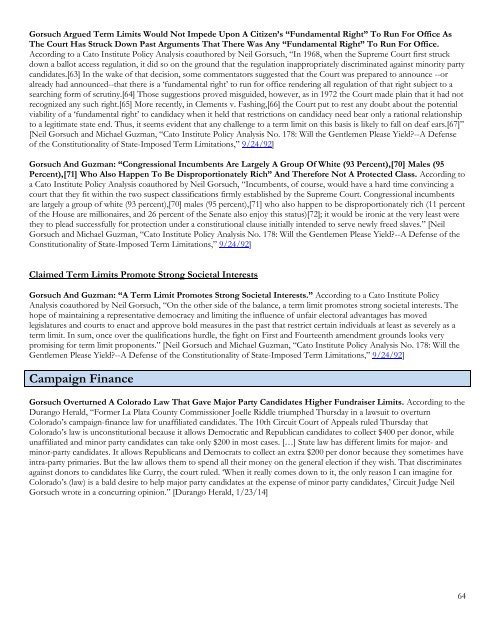You also want an ePaper? Increase the reach of your titles
YUMPU automatically turns print PDFs into web optimized ePapers that Google loves.
<strong>Gorsuch</strong> Argued Term Limits Would Not Impede Upon A Citizen’s “Fundamental Right” To Run For Office As<br />
The Court Has Struck Down Past Arguments That There Was Any “Fundamental Right” To Run For Office.<br />
According to a Cato Institute Policy Analysis coauthored by <strong>Neil</strong> <strong>Gorsuch</strong>, “In 1968, when the Supreme Court first struck<br />
down a ballot access regulation, it did so on the ground that the regulation inappropriately discriminated against minority party<br />
candidates.[63] In the wake of that decision, some commentators suggested that the Court was prepared to announce --or<br />
already had announced--that there is a ‘fundamental right’ to run for office rendering all regulation of that right subject to a<br />
searching form of scrutiny.[64] Those suggestions proved misguided, however, as in 1972 the Court made plain that it had not<br />
recognized any such right.[65] More recently, in Clements v. Fashing,[66] the Court put to rest any doubt about the potential<br />
viability of a ‘fundamental right’ to candidacy when it held that restrictions on candidacy need bear only a rational relationship<br />
to a legitimate state end. Thus, it seems evident that any challenge to a term limit on this basis is likely to fall on deaf ears.[67]”<br />
[<strong>Neil</strong> <strong>Gorsuch</strong> and Michael Guzman, “Cato Institute Policy Analysis No. 178: Will the Gentlemen Please Yield?--A Defense<br />
of the Constitutionality of State-Imposed Term Limitations,” 9/24/92]<br />
<strong>Gorsuch</strong> And Guzman: “Congressional Incumbents Are Largely A Group Of White (93 Percent),[70] Males (95<br />
Percent),[71] Who Also Happen To Be Disproportionately Rich” And Therefore Not A Protected Class. According to<br />
a Cato Institute Policy Analysis coauthored by <strong>Neil</strong> <strong>Gorsuch</strong>, “Incumbents, of course, would have a hard time convincing a<br />
court that they fit within the two suspect classifications firmly established by the Supreme Court. Congressional incumbents<br />
are largely a group of white (93 percent),[70] males (95 percent),[71] who also happen to be disproportionately rich (11 percent<br />
of the House are millionaires, and 26 percent of the Senate also enjoy this status)[72]; it would be ironic at the very least were<br />
they to plead successfully for protection under a constitutional clause initially intended to serve newly freed slaves.” [<strong>Neil</strong><br />
<strong>Gorsuch</strong> and Michael Guzman, “Cato Institute Policy Analysis No. 178: Will the Gentlemen Please Yield?--A Defense of the<br />
Constitutionality of State-Imposed Term Limitations,” 9/24/92]<br />
Claimed Term Limits Promote Strong Societal Interests<br />
<strong>Gorsuch</strong> And Guzman: “A Term Limit Promotes Strong Societal Interests.” According to a Cato Institute Policy<br />
Analysis coauthored by <strong>Neil</strong> <strong>Gorsuch</strong>, “On the other side of the balance, a term limit promotes strong societal interests. The<br />
hope of maintaining a representative democracy and limiting the influence of unfair electoral advantages has moved<br />
legislatures and courts to enact and approve bold measures in the past that restrict certain individuals at least as severely as a<br />
term limit. In sum, once over the qualifications hurdle, the fight on First and Fourteenth amendment grounds looks very<br />
promising for term limit proponents.” [<strong>Neil</strong> <strong>Gorsuch</strong> and Michael Guzman, “Cato Institute Policy Analysis No. 178: Will the<br />
Gentlemen Please Yield?--A Defense of the Constitutionality of State-Imposed Term Limitations,” 9/24/92]<br />
Campaign Finance<br />
<strong>Gorsuch</strong> Overturned A Colorado Law That Gave Major Party Candidates Higher Fundraiser Limits. According to the<br />
Durango Herald, “Former La Plata County Commissioner Joelle Riddle triumphed Thursday in a lawsuit to overturn<br />
Colorado’s campaign-finance law for unaffiliated candidates. The 10th Circuit Court of Appeals ruled Thursday that<br />
Colorado’s law is unconstitutional because it allows Democratic and Republican candidates to collect $400 per donor, while<br />
unaffiliated and minor party candidates can take only $200 in most cases. […] State law has different limits for major- and<br />
minor-party candidates. It allows Republicans and Democrats to collect an extra $200 per donor because they sometimes have<br />
intra-party primaries. But the law allows them to spend all their money on the general election if they wish. That discriminates<br />
against donors to candidates like Curry, the court ruled. ‘When it really comes down to it, the only reason I can imagine for<br />
Colorado’s (law) is a bald desire to help major party candidates at the expense of minor party candidates,’ Circuit Judge <strong>Neil</strong><br />
<strong>Gorsuch</strong> wrote in a concurring opinion.” [Durango Herald, 1/23/14]<br />
64


